NEW ORLEANS
April 16, 2011
STRANGER: Anne Rolfes
LOCATION: Lüke, 333 St. Charles Avenue, New Orleans
THEME: Eating with an environmentalist
Do you know what it means to miss New Orleans?
I do. I love the city and for the past three years my friends and I have had a long weekend in the Crescent City seeing the sights, eating great food, and having perhaps a little too much to drink. The trip is always a highlight of the year.
Our latest visit was one weekend in April. While in the city I figured it’d be a good chance to do another dinner interview. So it was one warm Saturday morning I found myself stumbling to a brunch interview predictably late and almost as predictably hungover.
Mercifully the Whitney-Wyndham hotel that our little group was staying at was less than a minute’s walk to the interview location, a bright, welcoming restaurant called Lüke.
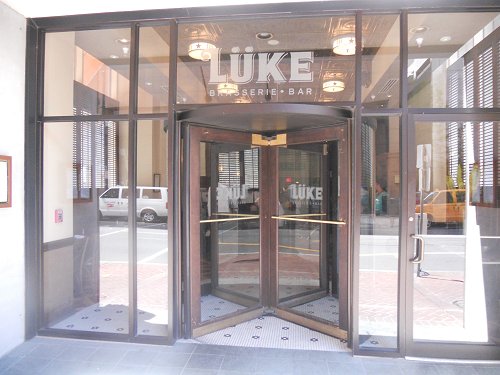
I was there to met Anne Rolfes, founding director of the Louisiana Bucket Brigade. The Brigade works with often low-income fenceline communities, so called because they’re located near the fences of major refineries and chemical facilities. The Brigade encourages grassroots activism to curb pollution from the plants. “Our purpose is to assist fenceline neighbors in their campaigns to make industry accountable for its pollution,” according to the Brigade’s website.
Friendly to a fault, Anne had no problem with my late arrival. She was reading a newspaper at the polished wooden bar and greeted me with a smile and reassurance that my tardiness was not an issue. As we stepped up to request a table, the maître d’ also downplayed any social faux pas, saying that things in New Orleans run on a more relaxed schedule than other cities.
After we sat down and scanned the menu, Anne told me she’d been reading some of my old interviews and was worried she couldn’t compete with the likes of a gay-for-pay porn star or a clown who turned up to a diner wearing full circus costume and makeup.
Anne needn’t have worried. She’s got an interesting story to tell.

Born in Lafayette, Louisiana — about 150 miles from New Orleans — she has lived in Colorado, Togo and California, before coming full circle back to the Pelican State.
Apparently her neighborhood growing up was home to a lot of people who made money off the state’s big oil industry. It was “very nice” growing up. Not at all like Refinery Row — the communities near refineries that Anne now works with through the Bucket Brigade. “I saw the beneficial side of the oil industry where I grew up,” she said.
After high school, in the late 1980s, she went to university in Colorado, a location she chose because her sister was living out there. She started out pursuing a major in Central and Eastern European studies under the tutelage of “kind of a right wing” older Polish man who had survived the Nazi invasion of his home country. “He had all these great stories,” Anne said, but as a tutor he wasn’t what she was looking for, and so Anne switched to a major in political science.
That’s when Anne told me, “I can’t talk to you.”

She’d just taken a first taste of her crawfish bisque. “I can’t talk to you cause I want to eat it,” she said, delighted with her choice. “My god, that is really good.”
I agree. Anne offered me a taste so I took a light spoonful of the bisque. Not normally a huge fish fan — unless it’s whitefish and deep-fried — I was a bit wary of a fish soup being the first thing to pass my lips that day, but my fear was misplaced. The crawfish was definitely there, but the bisque was tangy yet smooth at the same time, and tasted great.
My uncreative dish of pancakes and syrup was yet to arrive, so I persuaded Anne to balance her first course with the continuation of her mini-biography.
After graduating she went to San Francisco for roughly six months while waiting to start work with the Peace Corps in Togo. Then it was back to the City by the Bay, and a chance read of a Harper’s article about oil industry abuses in Nigeria stirred her internal activist. In addition to detailing land grabs and physical violence by petroleum companies against the native Ogoni people, accompanying pictures hit home the hardest for Anne.
“The people in the pictures looked exactly like the people I had been living with in West Africa and was really close with,” Anne said as she thought back to Peace Corps. “And there they are getting shoved by military guys and oil contractors. I was horrified.”
“I knew I wanted to get involved, but I didn’t know how”
Determined to take action, Anne found herself in the right city because San Francisco has “every kind of group you could imagine.” She joined Project Underground, a name that referred to the extraction industries that mined for oil in Africa and Indonesia.
As a volunteer, one of Anne’s tasks was to stand outside Shell gas stations on the 19th of every month waving placards and signs criticizing the company’s actions overseas. The date was symbolic for 19 Ogoni arrested for fighting a Shell takeover of their land.
The volunteerism turned into a full-time position and Anne was with Project Underground for about five years. Toward the end of her time with the organization she went to the Republic of Benin in West Africa, location of a refugee camp for Ogoni driven from their homes. She interviewed residents of the camp and Project Underground released a report on the plight of the Ogoni people. As a result, “a lot of them were relocated to the United States, some to my home town of Lafayette,” she said.
In 1999 she was ready for a change and looked at moving back to Louisiana.
Much like Anne told me she couldn’t talk when eating her crawfish bisque, I can’t continue typing without making reference to the tastiness of my pancakes.
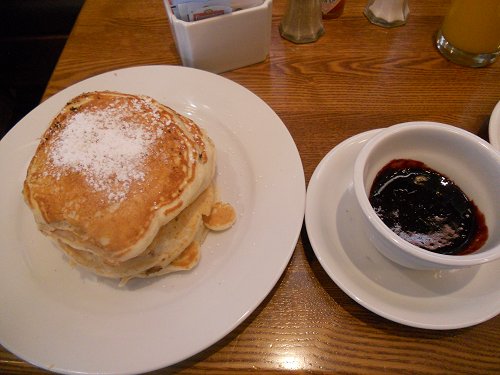
A basic breakfast dish to be sure, but these were some of the best-cooked pancakes I’ve ever had. Not too dry, not too moist, still warm when served and piled ridiculously high. The dish came with a serving of local berry cane syrup which was very moreish. Tart and fresh, it was a much better condiment for pancakes than the typical go-to of maple syrup.
Anne’s second course arrived at the same time as my pancakes.
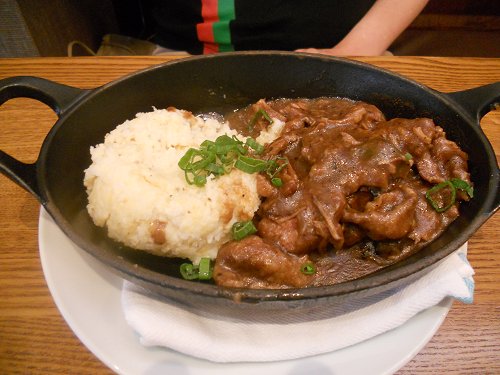
She chose the grillades and grits, a typical New Orleans breakfast or brunch dish, apparently. Grillades are pieces of meat slow-cooked with vegetables, and served with grits. Much like her favorable take on the the bisque, Anne gave a rave review to this dish.
As we made our way through the generous portions, Anne told me that when she moved back to Louisiana she knew she wanted to work on issues similar to those at Project Underground. “I knew I wanted to get involved, but I didn’t know how,” she said.
Then she attended a “bucket” training session near Lake Charles, Louisiana, where local residents were using the buckets — cheap versions of expensive air monitors — to take samples of air quality to determine the impacts of pollution from nearby facilities. It’s a low-cost technology that has the Environmental Protection Agency’s approval.
Anne saw the benefits of buckets and wanted to get more people using them. She said the buckets can provide useful information to tie pollution increases from industrial plants with adverse health effects. For example, if a child is outside playing and has an asthma attack, residents might suspect it has something to do with the smoke and smell coming from a refinery. “But there’s no way to document it” without a bucket, Anne said. Having the bucket and the data it collects allows documentation of what was in the air at a given time.
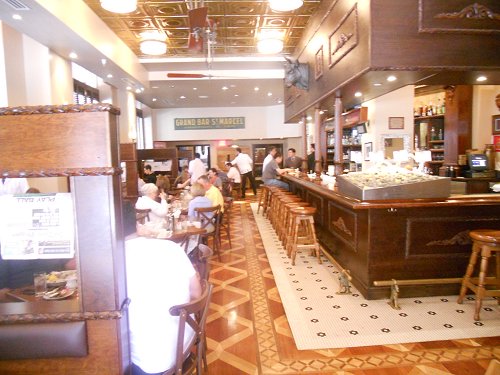
The buckets can therefore provide data to justify a facility taking steps to reduce nearby residents’ exposure to air pollution or relocate them, Anne said. “If we know that this company is producing a chemical, we know it’s in the community because we have their reports that are quite valid, and we have samples, common sense says why shouldn’t we get them out of the way?” she asked.
“That whole paradigm of the community members having to prove their exposure, and even more than that their illness, is really messed up,” Anne said, arguing that the onus should be on industry. “Their retort is that you can’t prove your illness came from an exposure. Well how about taking some precautionary steps and investigating it a little further?”
Anne first tried to work with existing state environmental groups such as the Louisiana Environmental Action Network, but they were operating at capacity. So it was that in January 2000 she launched the Louisiana Bucket Brigade.
Some residents want to relocate, some simply want companies to reduce their pollution. Anne’s group aims “to help them figure out what they want and then go after it.”
The data collected from the buckets can be used to pressure industry to make changes to their facilities or heed resident’s concerns, and it’s led to some wins for the Bucket Brigade. But even with those victories, the organization is constantly fighting battles, some associated with major disasters in the state including Hurricane Katrina and the April 2010 BP oil spill in the Gulf of Mexico.

On a visit to New Orleans in 2009, I noticed how even at a legendary restaurant that usually has long lines it was easy to get a prime table in the venue’s courtyard, which my dining companion at the time noted was a sign of the city’s slow recovery from Katrina. But Anne said that “long before” Katrina there have been public health problems in Louisiana. “These communities are so sick and nobody’s paying attention.”
More people might pay attention in light of the BP oil spill. “I think now with the BP disaster people who always blindingly supported the industry now realize there are questions about it,” Anne said, citing what she claims are lingering health and pollution problems associated with the spill and criticisms of the oil company’s handling of the fallout from the disaster.
Yet Anne doesn’t hate industry, she’s not a foaming-at-the-mouth anti-capitalist. She just wants to see a more equitable balance between profit and protection. And the way she spoke at brunch in a confident but relaxed manner, with an outgoing personality, makes it easy to picture her as the leader of a group, taking charge and corralling the forces with a friendly but determined attitude.
“The oil industry has been able to get away with so much because the industry is good for the economy. Which is true. But there should be a little asterisk there, which is they’re externalizing their costs on us quite seriously,” Anne said. Industry generally isn’t taking important steps like reducing accidents at facilities or limiting its air pollution, she added.
“It is a situation in which we are really dominated by the oil industry. It’s an unequal battle as far as resources are concerned,” Anne said. Industry’s overwhelming resources have led to some setbacks, like the time a refinery paid off residents to end what until then had been support for a member of their community leading a fight against the facility.
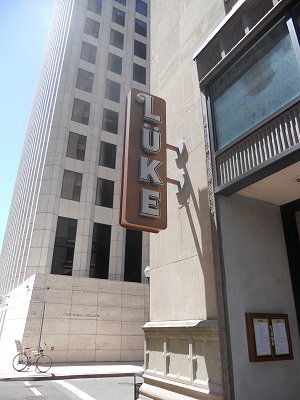
Just before Christmas one year, the company apparently hired a local preacher to go door-to-door in a Refinery Row neighborhood and offer $1,500 cash to each of the residents if the community leader would back off in her fight against the facility. Anne looked genuinely disappointed when she said that the leader had to contend with all her neighbors knocking on her door and asking why she was ruining Christmas. “So she threw in the towel” and the cash was delivered, Anne said. “Of course they could have gotten so much more. That was the worst. That was the trough.”
Even though there are some negative experiences, Anne said that the successes are more frequent for the Bucket Brigade, particularly “when you land a blow” against industry.
Successes include having an oil company buy out contaminated property “for a fair price” so that residents living on the property could move away. In another example, a refinery granted the community’s wishes to pay for the installation of air quality monitors.
Those are tangible success stories, but even intangible success counts, Anne said. “The success is almost just our being here, and being that point of resistance” against industry.
Anne credits a lot of the good news stories to the residents that form the Brigade’s membership. “The people I’ve worked with, who some have not been traditionally educated, have this hard-hitting, keen, right-on understanding of what’s happening in a way that the people I grew up with never could. The people I grew up with had this particular way of thinking, they can’t imagine a refinery being bad.”
What would it take for the work of the Bucket Brigade to be complete?
“You know what would do it? If they would put in these buffers around the plants and refineries here for a couple of miles and get everybody out of the way” of pollution, Anne said. “And if refineries stopped having accidents. That’s it. I would retire.”
But Anne doesn’t want to retire. Leading the Bucket Brigade, she wants to change refineries “at their system, and I’ll have plenty of work for a long time.”
tashzb